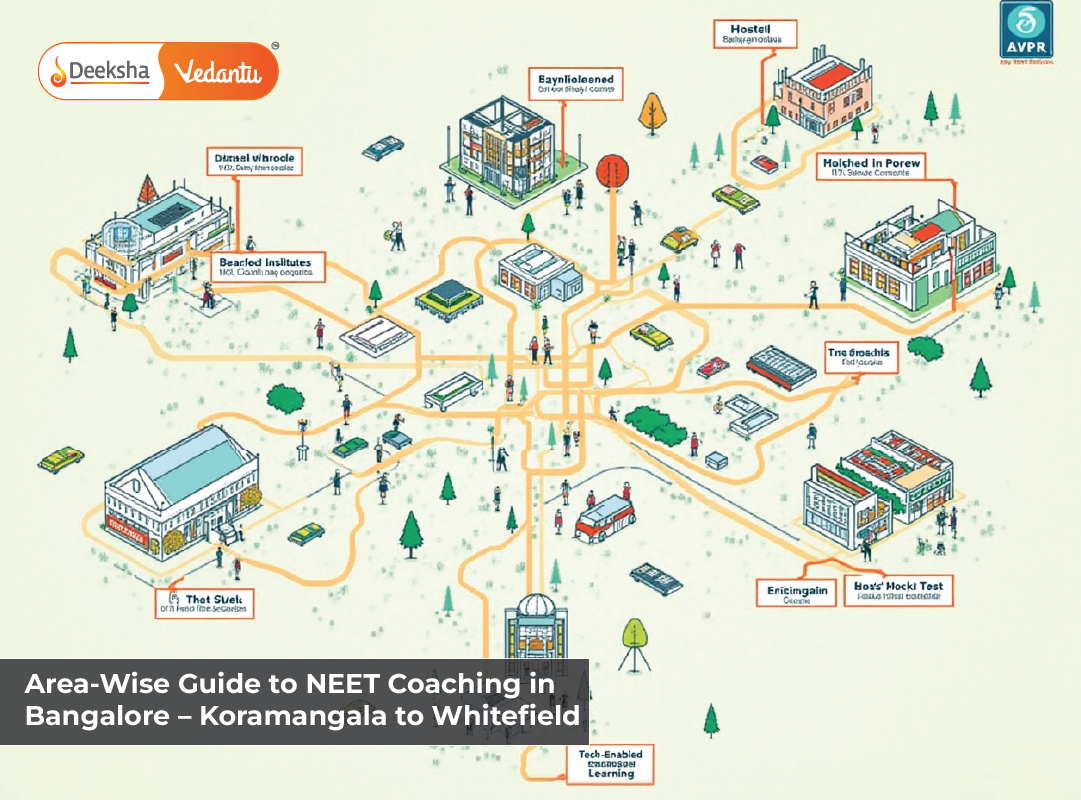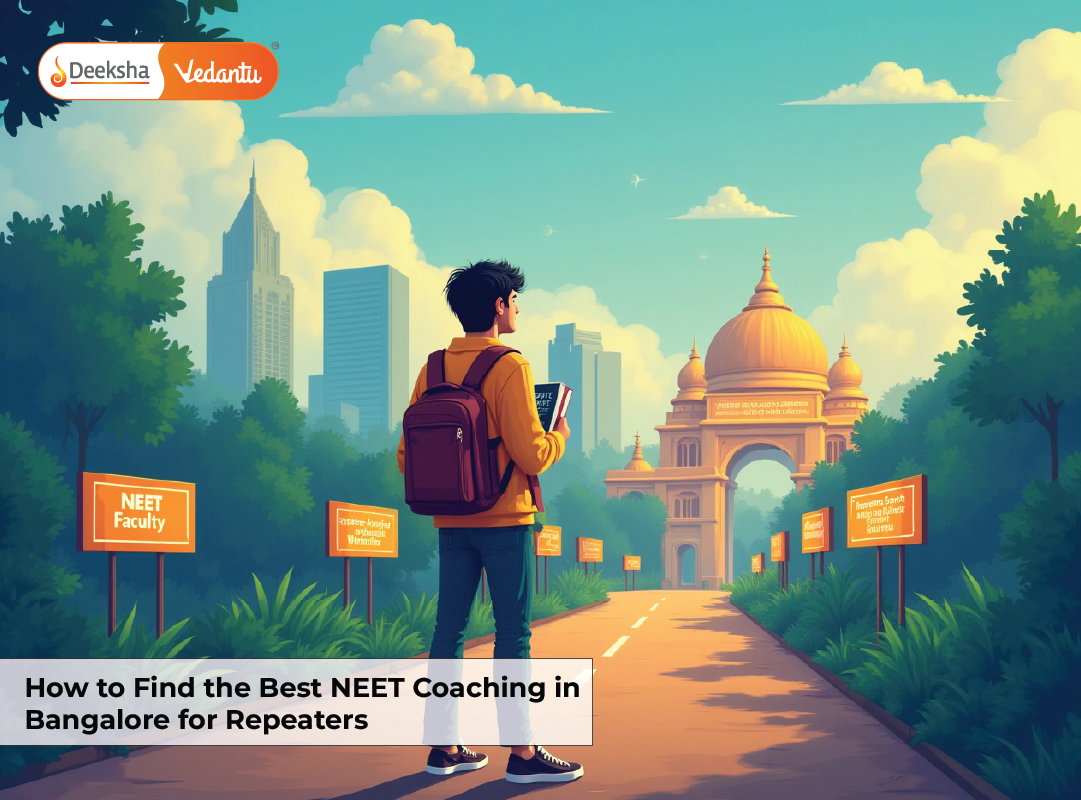Introduction
Science PU students often find themselves juggling dual academic goals—scoring high in board exams while also preparing rigorously for competitive exams like NEET, JEE, or CET. Although both paths are vital for a successful future, they differ in approach, content depth, and exam pattern. Managing both simultaneously requires strategic planning, discipline, and smart study techniques.
At Deeksha Vedantu, we understand the unique pressure Science PU students face. Our integrated approach focuses on streamlining preparation for both board and competitive exams without compromising on either. In this guide, we share proven methods and practical strategies to help students find the right balance and stay ahead in their academic journey.
Understanding the Difference: Boards vs Competitive Exams
Knowing how board exams and competitive tests differ helps in tailoring a strategy that accommodates both. Students must understand the nature of questions, expectations from evaluators, and the examination formats.
Key Differences:
| Aspect | Board Exams | Competitive Exams |
| Focus | Conceptual clarity, presentation skills | Application, speed, accuracy |
| Question Type | Descriptive, theory-based | MCQs, numerical, analytical |
| Syllabus Depth | Based on NCERT textbook | NCERT + Advanced concepts |
| Time Management | Time for explanation | Strict time limits, negative marking |
| Evaluation Criteria | Step-wise marks | Final answer-based |
While board exams test understanding and expression, competitive exams assess depth of knowledge and ability to apply concepts quickly under pressure.
Creating a Dual-Focused Study Plan
Balancing two different exam formats requires a well-structured and flexible study plan. It should account for class lectures, coaching hours, self-study, revisions, and relaxation.
Elements of an Effective Study Plan:
- Map the syllabus overlap between board and competitive exams
- Allocate fixed hours weekly for each type of preparation
- Keep early mornings for revision and evenings for problem-solving
- Schedule dedicated time for diagrams, writing practice, and MCQs
- Integrate rest periods and buffer days to prevent burnout
Students should use calendars, planners, or productivity apps to organize their day-to-day and weekly targets.
Commerce PU courses at Deeksha Vedantu
Subject-Wise Strategy: Physics, Chemistry, Biology/Maths
Each subject in Science requires a different balance between theory (for boards) and application (for competitive exams).
Physics:
- Focus on derivations, laws, SI units, and theorems for boards
- Solve conceptual and numerical problems for NEET/JEE using mock sheets
- Practice solving problems using different approaches for deeper understanding
- Use visual aids like animations and simulations for clarity
Chemistry:
- Study reactions and equations with mechanisms for boards and MCQs
- Memorize p-block/inorganic data and use mnemonics for NEET and JEE
- Focus on logical patterns in physical chemistry problems
- Revise tables, periodic trends, and electrochemistry frequently
Biology:
- Study NCERT thoroughly—line-by-line preparation is critical for NEET
- Draw, label, and explain diagrams for board exams
- Use mind maps, flowcharts, and one-pagers for last-minute revision
- Practice previous years’ NEET questions chapter-wise
Mathematics (if applicable):
- Understand and practice derivations, formulas, and theory for boards
- Solve application-based problems under timed conditions for JEE/CET
- Use shortcut methods and formula banks for problem-solving speed
Time Management Techniques
Time is the most valuable resource. Effective scheduling and discipline help students achieve their goals without feeling overwhelmed.
Weekly Planner Example:
| Day | Boards Focus (2 hrs) | Competitive Focus (3 hrs) |
| Monday | Theory: Physics Ch. 4 | JEE/NEET Physics MCQs |
| Tuesday | Chemistry Notes Revision | Organic Chemistry Practice |
| Wednesday | English/Language Prep | Maths/Chemistry Problem Sets |
| Thursday | Diagrams & Biology Theory | NEET Biology NCERT Drill |
| Friday | Model Paper Writing | Timed Practice Test |
| Saturday | Grammar, Languages | Chapter-wise MCQs (Any Subject) |
| Sunday | Weekly Review & Rest | Mock Test & Analysis |
Even a 30-minute focused session can be more effective than several hours of distracted study.
Residential PU programs at Deeksha Vedantu
Effective Use of Resources
The right resources can boost productivity and confidence. Rather than using too many books, focus on a selected set of materials and master them well.
For Board Exams:
- NCERT textbooks
- School-provided notes and question banks
- Previous year board papers and solutions
- Sample papers for writing practice
For Competitive Exams:
- NCERT + advanced concept books (HC Verma, OP Tandon, Dinesh, etc.)
- Deeksha Vedantu’s curated MCQ banks and test series
- Learning apps like Vedantu’s online platforms
- Video lectures, mock tests, and AI-powered assessments
Create a personalized list of go-to materials and stick with them to avoid confusion.
Mock Tests: The Backbone of Competitive Prep
Taking regular mock tests is critical for building exam-taking skills. It helps students understand how to pace themselves and avoid careless mistakes.
Why Mock Tests Matter:
- Improve speed and accuracy
- Help identify weak topics and gaps in understanding
- Build exam temperament and reduce anxiety
- Enhance familiarity with exam formats and OMR sheets
Mock tests should be followed by detailed analysis. At Deeksha Vedantu, every test comes with a breakdown of strengths and weaknesses to fine-tune strategies.
Stress Management and Mental Wellness
Intensive exam preparation can be mentally exhausting. Maintaining mental health is crucial for sustaining long-term performance.
Tips for Mental Wellness:
- Practice mindfulness and short breathing exercises daily
- Use short 5-minute mental breaks after every 40–50 minutes of study
- Maintain a balanced diet rich in brain foods (nuts, fruits, vegetables)
- Sleep 7–8 hours regularly to improve memory consolidation
- Avoid excessive screen time and late-night study marathons
- Stay connected with supportive family and friends
At Deeksha Vedantu, trained counselors offer individual guidance to help students manage anxiety and stay emotionally healthy.
Role of Teachers and Mentors
In the dual exam preparation journey, mentorship plays a crucial role. Regular feedback, doubt-solving, and motivational support can uplift a student’s morale.
How Mentors Help:
- Identify areas that need focused improvement
- Provide exam-specific tips and tricks
- Offer balanced advice between board and competitive priorities
- Encourage students to reflect and take ownership of their progress
Our mentors at Deeksha Vedantu follow a personalized mentoring model that keeps students aligned with both short- and long-term academic goals.
Peer Study Groups and Collaborative Learning
Studying with peers enhances engagement, builds clarity, and boosts accountability.
Advantages:
- Peer teaching simplifies complex concepts
- Learning becomes interactive and enjoyable
- Motivation levels rise with shared progress
- Healthy competition promotes discipline
Weekend group sessions or Q&A huddles can work wonders if structured properly.
FAQs
Can I focus on both boards and NEET/JEE without compromising one?
Yes. With a smart strategy and disciplined routine, many students excel in both.
Should I prepare for boards first and then shift to competitive prep?
An integrated approach is better. Many concepts overlap, and early MCQ practice builds familiarity.
How do I manage language subjects along with Science prep?
Dedicate specific days for languages. Don’t ignore them, as they contribute to the board aggregate.
How often should I take mock tests?
Once a week for competitive exams, and once a month for board-style papers until 2 months before exams, then increase frequency.
Does Deeksha Vedantu provide integrated coaching?
Yes. Our PU program is designed to align board syllabi with NEET, JEE, and CET prep through an integrated, student-focused model.
Is it necessary to attend additional tuitions?
Not if your PU program is integrated. A structured program like Deeksha Vedantu covers all necessary preparation comprehensively.
How do I avoid burnout during long study hours?
Take breaks, exercise lightly, meditate, and set achievable daily targets. Don’t skip meals or sleep.
Conclusion
Balancing board exams and competitive exams is challenging but entirely achievable. With structured planning, consistent effort, and the right support, students can perform exceptionally well in both. An integrated strategy minimizes stress and maximizes output.
At Deeksha Vedantu, we provide the environment, mentorship, and academic structure to help students achieve dual success. We believe in not just preparing students for exams but empowering them to grow into disciplined, confident achievers who are equipped to face real-world academic challenges.
Table of Contents















Get Social